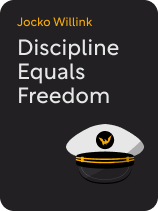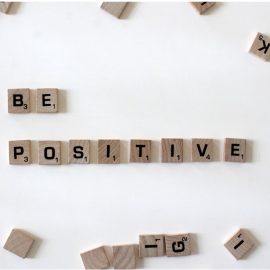

This article is an excerpt from the Shortform book guide to "Discipline Equals Freedom" by Jocko Willink. Shortform has the world's best summaries and analyses of books you should be reading.
Like this article? Sign up for a free trial here.
What are some Discipline Equals Freedom quotes? What can we learn about self-discipline from these quotes?
Discipline Equals Freedom by Jocko Willink skips the motivational fads and fluff to deliver the harsh but empowering truth that simple, relentless discipline is the key to becoming the best version of yourself. If you want to master your mind, practicing discipline will help you do so.
Keep reading for Discipline Equals Freedom quotes that will help you achieve your highest goals.
Discipline Equals Freedom by Jocko Willink Quotes
In Discipline Equals Freedom, Jocko Willink argues that the key to mastering your mind, reaching your highest goals, and discovering your full potential is unwavering discipline. Willink is an author, speaker, and podcaster that shares his lessons and philosophy of discipline acquired from 20 years of service as a US Navy SEAL. Through his military and leadership experience, he’s learned that success depends on disciplined, daily decisions like waking up early and putting off your break until tomorrow.
Below, we’ll look at a few Discipline Equals Freedom quotes with explanations.
“Don’t expect to be motivated every day to get out there and make things happen. You won’t be. Don’t count on motivation. Count on Discipline.”
Willink gives four reasons you need self-discipline:
1. Self-discipline makes you the master of yourself. By cultivating and practicing discipline, Willink explains that you gain control over your thoughts and actions. This allows you to overcome bad habits, false excuses, distractions, and emotions to effectively accomplish daily tasks that lead to your long-term goals. Therefore, by removing self-imposed obstacles, discipline frees you to live the life you want most.
(Shortform note: In Crucial Conversations, the authors explain that you can learn to control your emotions by understanding how emotions form and manipulating a key step in this process: your interpretation of emotional triggers. Whenever you perceive a trigger, you naturally tell yourself a story about what you perceived, which influences your emotional response and ultimately, your actions. By controlling the story you tell yourself, you control the way you feel. Knowing this can help you effectively steer your emotions in ways that lead to disciplined action.)
2. Self-discipline makes you healthier. When you take control over your actions, you have the power to resist unhealthy temptations. Instead, you’ll be able to develop and maintain habits that keep you healthy—like a clean, nourishing diet and a regular exercise routine.
(Shortform note: Health professionals recognize the crucial role of discipline in good health. Describing the basics of weight loss, Mayo Clinic highlights commitment to changes in diet and exercise habits as the key to successful weight loss. In this context, “commitment” seems nearly synonymous with Willink’s definition of “discipline.” That is, an internal force that drives you to take action and improve. However, Mayo Clinic’s idea of commitment seems to differ from Willink’s idea of self-discipline in that it’s not limited to an isolated, internal struggle for self-control. The Mayo Clinic suggests recruiting your doctor and loved ones for support in your health journey.)
3. Self-discipline helps you reach your goals and realize your full potential. Most of us have dreams and aspirations about things we want to accomplish or the type of person we want to be. Willink contends that even if you don’t have a clear vision for yourself, you’re likely capable of many great things. You might even have talents or resources to make certain goals more attainable. However, it’s discipline that helps you take control of your life and drive the actions necessary to develop good habits, reach your goals, and become the best version of yourself.
(Shortform note: The 5 AM Club discusses practical ways to discover your potential through discipline. This starts with waking up at—you guessed it—5 a.m. and using the first hour of your day to perform a self-improvement routine consisting of exercise, reflection, and professional growth.)
4. Self-discipline makes you happier. Willink believes that you achieve happiness by earning it. When you commit to bettering yourself through discipline in pursuit of your goals, you’ll find happiness along the way. Though Willink doesn’t explain exactly why or how you find happiness in the process of practicing discipline, we can infer that discipline makes you happier because the process of steadily bettering yourself will lead you to feel more healthy, confident, and satisfied.
“Don’t fight stress. Embrace it. Turn it on itself. Use it to make yourself sharper and more alert. Use it to make you think and learn and get better and smarter and more effective. Use the stress to make you a better you.”
Accept what you can’t control and embrace it as an opportunity. When you’re faced with a challenge or setback that’s out of your control, Willink suggests viewing it as an opportunity to develop a new plan and improve in some way. For example, if an injury or illness prevents you from performing your regular workout routine, use your rest time as an opportunity to catch up on your reading list.
Besides difficult situations in the present, Willink notes that we often struggle to accept moments from our past. Accepting the past will free your mind of unproductive, stressful thoughts and help you focus on the present. You can’t change what’s already happened, so learn from your regrets and move on.
If you’re feeling overwhelmed by emotion or the difficulty of a problem, it’s a sign you need to detach. Willink suggests this strategy to physically and mentally remove yourself from a stressful situation, calm down, and think more clearly:
- Take a step back.
- Put your hands at your sides.
- Raise your chin to a vulnerable/open position.
- Look around.
- Take deep breaths.
- Listen instead of talk.
- When you do talk, try to ask a question in a calm state, rather than making an assertion.
“There is no easy way. There is only hard work, late nights, early mornings, practice, rehearsal, repetition, study, sweat, blood, toil, frustration, and discipline.”
Although discipline is a principle that should affect all spheres of life, Willink highlights a few key areas of daily life in which to apply discipline for more excellent health and self-improvement.
- Exercise has tremendous benefits for physical and mental health. Because of this, it’s important to include some kind of exercise in your life.
- As with exercise, Willink has a few key tips for applying discipline to your diet. One is to eat mostly fat, then protein; minimize carbohydrates and sugar. Willink bases his diet on the premise that human bodies aren’t adapted to eating many of the farmed and processed foods on the modern menu.
- To practice discipline and have energy to perform well during the day, it’s important to apply discipline to your sleep habits at night. Adults need anywhere from seven to nine hours of sleep on average. Lack of sleep can lead to increased blood pressure, negative hormonal changes, immune system suppression, and cognitive effects like trouble focusing and thinking.

———End of Preview———
Like what you just read? Read the rest of the world's best book summary and analysis of Jocko Willink's "Discipline Equals Freedom" at Shortform.
Here's what you'll find in our full Discipline Equals Freedom summary:
- Lessons and the philosophy of discipline from a Navy SEAL
- The importance of daily habits like waking up early and putting off breaks
- How self-sabotage actually stems from laziness






